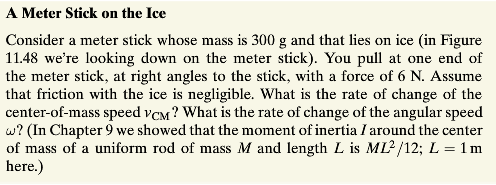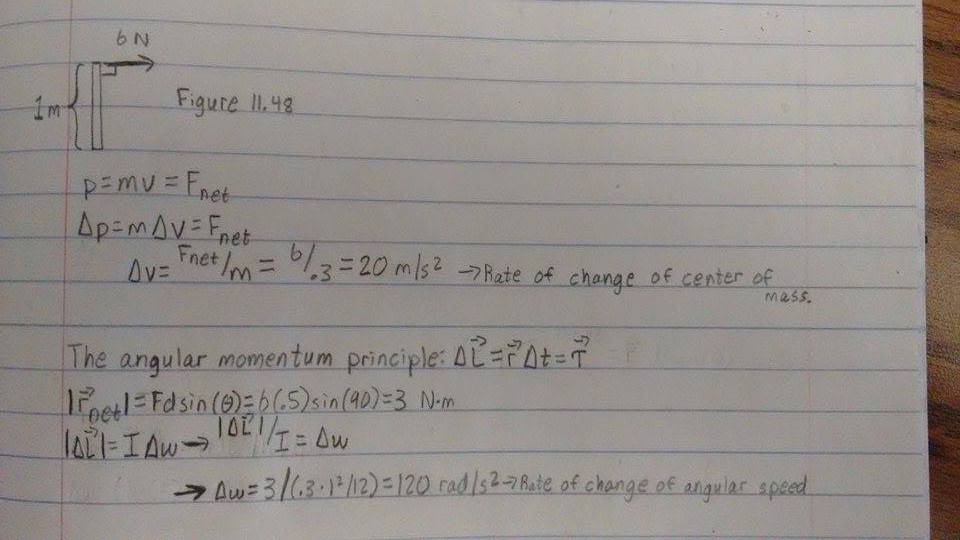Systems with Nonzero Torque: Difference between revisions
| Line 12: | Line 12: | ||
The angular momentum principle is the following: <math>{\frac{d\vec{L}}{dt}}= \vec{r} * \vec{F}_{net} = \vec{т}_{net} </math> <br> | The angular momentum principle is the following: <math>{\frac{d\vec{L}}{dt}}= \vec{r} * \vec{F}_{net} = \vec{т}_{net} </math> <br> | ||
As previously mentioned, we'll now look at the case where <math> \vec{F}_{net} </math> is NOT equal to 0. | As previously mentioned, we'll now look at the case where <math> \vec{F}_{net} </math> is NOT equal to 0. | ||
==Examples== | ==Examples== | ||
Revision as of 00:59, 6 December 2015
In certain systems, external torques have an effect on a system's angular momentum. Since these external forces do not sum to zero, we end up with a system with non-zero net torque.
The Main Idea
With previous systems involving torque, we've been fortunate enough to have systems where the net torque is non-zero, hence [math]\displaystyle{ \vec{L}_{final} = \vec{L}_{initial}. }[/math]
See systems with zero net torque in "See Also" section below for more information.
However, we're not always fortunate enough to have such systems. In such cases, our computations become a little more complicated, and we'll see how below.
A Mathematical Model
The angular momentum principle is the following: [math]\displaystyle{ {\frac{d\vec{L}}{dt}}= \vec{r} * \vec{F}_{net} = \vec{т}_{net} }[/math]
As previously mentioned, we'll now look at the case where [math]\displaystyle{ \vec{F}_{net} }[/math] is NOT equal to 0.
Examples
Simple
- Example taken from College Physics textbook
A constant net nonzero torque is exerted on an object. Which of the following quantities cannot be constant for this object?
A) Moment of inertia
B) Center of mass
C) Angular momentum
D) Angular velocity
E) Angular acceleration
Solution/Explanation:
C, D. Why?
A) Moment of inertia does not change depending on whether torque is exerted on an object; moment of inertia depends on the object and axis of rotation, nothing more.
B) Center of mass doesn't change with applied torque as well.
C) Angular momentum is equal to inertia times angular speed, and we establish below that angular velocity changes.
D) Angular velocity changes since a constant force is being applied to the object, so it's speed/velocity must inherently increase.
E) Because the torque being applied is constant, angular acceleration does not change (remember, acceleration is a measure of the rate of change of velocity!).
Middling
- Example taken from Interactions and Matter: 4th Edition textbook
Connectedness
- How is this topic connected to something that you are interested in?
- I had taken physics in high school, and a majority of the concepts covered in this class were familiar to me. However, I had never seen any of the material we covered in the last unit (like angular momentum, conservation of angular momentum, torque, etc.). This material was new and something I found interesting since it went a step further with the information we learned throughout the semester.
- How is it connected to your major? Is there an interesting industrial application?
- My major is Computer Science, so I cannot really draw a clear line between my current coursework and this topic. That being said, physics is, of course, used in computer science. A good example would be in programming games where most interactions between objects involve physics of some kind, and the programmers/game designers want to model realistic situations in game. Another example that never really dawned upon me until about halfway through the semester was that both topics require a decent level skill in problem solving/reasoning. I've liked physics this semester because (and I guess this just applies to math in general) it's almost beautiful just to see how, in the end, everything works out and makes sense. Throughout the semester, I've never had a moment during class where I've flat out said, "No, that doesn't make sense" simply because that's never happened. I've never been a huge fan of physics, but even I can appreciate something that comes together so well.
History
This concept doesn't have it's own history since it's just a section under torque, so refer to http://www.physicsbook.gatech.edu/Torque#History for more information.
See also
A general description of torque: http://www.physicsbook.gatech.edu/Torque
External links
A brief overview on systems with non-zero torque
References
Matters and Interactions: 4th Edition
WebAssign
College Physics: Ninth Edition by Raymond Serway and Chris Vuille

